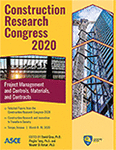Construction Research Congress 2020
Assessing Accuracy of Estimated Activity Durations in Construction CPM Schedules
Publication: Construction Research Congress 2020: Project Management and Controls, Materials, and Contracts
ABSTRACT
This paper’s fundamental question is whether construction baseline critical path method (CPM) schedules would benefit from requirements, or generally accepted industry practices, that cap maximum construction activity durations. The research conducted determined if lower estimated duration values for construction activities are more accurate on both an activity-by-activity and global basis. This question was answered by evaluating the accuracy of duration estimates by identifying and evaluating trends in 90 schedules from 45 construction projects. The data sample represented a diverse grouping of projects by markets, delivery methods, and ownership types. In all, more than 30,000 activities were evaluated to form this paper’s observations and findings. The paper has two principle findings. First, schedules that have a higher proportion of construction activities with original durations of one to five working days are more likely to have actual durations that match the baseline estimate. Schedules where at least 90% of construction activities had estimated durations of five or less days were nearly three times more likely to complete individual tasks within the planned duration than schedules where 25% or less of construction activities had durations of one to five days. Second, activities with estimated original durations of five or less days tend to have smaller duration variances than activities with longer original durations. Construction activities with durations between six to ten days had average variances that were 3.6 times larger than activities with durations of less than five days. Accordingly, this research supports the recommendation that industry scheduling and planning efforts would benefit from standards that prescribe maximum estimated durations for construction activities. This benefit would be realized in more accurate activity duration estimates both in terms of lower variances from actual durations and higher likelihood of completed within the planned duration.
Get full access to this article
View all available purchase options and get full access to this chapter.
REFERENCES
Carson, C., Oakander, P., and Relyea, C. (2014). CPM schedule for construction: best practices and guidelines. Project Management Institute, Inc., Newtown Square, PA., 140.
Douglas, E., et al. (2010) Recommend practice 37R-06: schedule levels of detail as applied in engineering, procurement, and construction, AACE International, Morgantown, WV., 4–7.
Glavinich, T. E. (2004). Construction planning and scheduling. The Associated General Contractors of America., Arlington, VA., 34.
Hobb, L., et al. (2007). Recommend practice 23R-02: identification of activities, AACE International, Morgantown, WV., 2-4.
Project Management Institute. (2011). Practice standard for scheduling – second edition. Newtown, Square, PA., 7-32.
Information & Authors
Information
Published In
Construction Research Congress 2020: Project Management and Controls, Materials, and Contracts
Pages: 622 - 630
Editors: David Grau, Ph.D., Arizona State University, Pingbo Tang, Ph.D., Arizona State University, and Mounir El Asmar, Ph.D., Arizona State University
ISBN (Online): 978-0-7844-8288-9
Copyright
© 2020 American Society of Civil Engineers.
History
Published online: Nov 9, 2020
Published in print: Nov 9, 2020
Authors
Metrics & Citations
Metrics
Citations
Download citation
If you have the appropriate software installed, you can download article citation data to the citation manager of your choice. Simply select your manager software from the list below and click Download.
